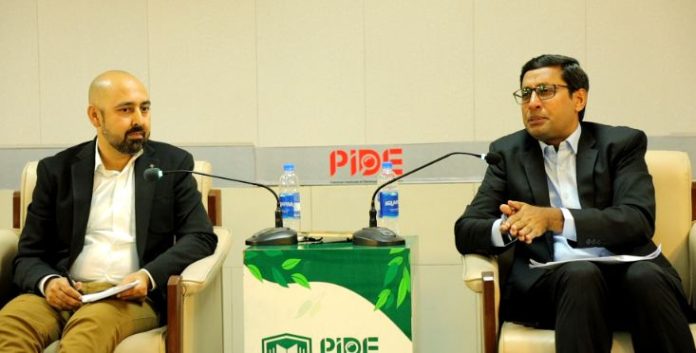ISLAMABAD, OCT 29 /DNA/ – The Pakistan Institute of Development Economics (PIDE), in collaboration with the Planning Commission’s RASTA initiative, organized a seminar titled “Pakistan’s Groundwater Crisis: Policy Lessons and a Framework for Sustainable Resource Use” at PIDE. The session featured Mr. Nazam Maqbool, Social Scientist and Project Manager at RASTA, as the keynote speaker, and was moderated by Dr. Muhammad Faisal Ali, Research Fellow at PIDE.
Opening the seminar, Dr. Faisal emphasized Pakistan’s alarming shift from a water-stressed to a water-scarce nation, noting that per-capita water availability has dropped from over 5,000 cubic meters in 1947 to less than 1,000 today. He observed that while surface water scarcity and climate change dominate public debate, the depletion of groundwater—Pakistan’s silent lifeline—remains dangerously neglected. Water, he stressed, forms the foundation of civilization and food security, and its mismanagement threatens both human and economic survival.
In his presentation, Mr. Maqbool explained that Pakistan is among the most arid countries in the world, receiving only 494 millimeters of average annual rainfall. The Indus River system accounts for nearly 96 percent of the country’s total water supply, with 78 percent originating outside Pakistan’s borders. He highlighted that Pakistan possesses the world’s fourth-largest aquifer and is the fourth-largest user of groundwater globally. The Indus Plain alone contains around 88,000 square kilometers of freshwater storage, equivalent to nearly 400 million acre-feet—about eighty times the capacity of all large dams combined. However, the country’s extraction of 65 cubic kilometers of groundwater annually far exceeds its recharge rate of 55 cubic kilometers, creating a growing water deficit.
Mr. Maqbool traced the historical evolution of groundwater use in Pakistan, explaining how colonial-era canal construction between 1870 and 1930 led to widespread waterlogging and salinity, prompting the 1960s Salinity Control and Reclamation Project, under which thousands of tubewells were installed. The subsequent decades saw electricity subsidies and drought-driven policies fueling a massive expansion in tubewell installation—reaching over 1.5 million unregulated wells today, with no effective legal controls on extraction.
Highlighting the scale of the problem, he revealed that 70 percent of Pakistan’s urban and more than 80 percent of its rural populations rely on unsafe drinking water sources, with nearly 60 million people exposed to arsenic contamination. Over 4.5 million hectares of land have been affected by salinity and waterlogging, particularly in Punjab and Sindh, while industrial and agricultural pollution continue to degrade groundwater quality. He further pointed out that Pakistan ranks second globally in groundwater stress within the Indus Basin, with Lahore alone losing three feet of groundwater annually.
Mr. Maqbool identified the lack of a binding national groundwater law, overlapping institutional mandates, weak coordination after the 18th Amendment, and severely underfunded utilities as core governance failures. He noted that electricity subsidies encourage over-pumping while only 24 percent of operational costs are recovered through existing tariffs. Despite tariff hikes after decades of stagnation, Punjab’s water price of just $0.12 per cubic meter remains far below the global average of $2.36. Limited monitoring systems, poor data collection, and minimal investment in drainage and recharge infrastructure have further prevented evidence-based planning and water governance.
To address these challenges, Mr. Maqbool proposed a seven-pillar action-oriented framework for sustainable groundwater management. His plan called for the establishment of a National Groundwater Council to coordinate policy across provinces; the introduction of provincial licensing, metering, and pricing reforms; comprehensive aquifer mapping; real-time data portals; and integrated water management strategies. He advocated for agricultural efficiency through the replacement of input subsidies with performance-based incentives and the promotion of drip and sprinkler irrigation systems. He also urged a shift from water-intensive crops such as sugarcane and rice to less water-demanding, high-yield alternatives like pulses and oilseeds.
Drawing from global best practices, Mr. Maqbool cited examples from Israel, which now meets 25 percent of its water demand by reusing 90 percent of treated wastewater, and from U.S. cities such as St. Paul and Duluth, which have successfully reduced urban water use by up to half through efficiency reforms. He emphasized the need for Pakistan to reform its pricing structure, promote transboundary cooperation on groundwater management within the Indus Basin, and invest in human capital through education, training, and awareness programs.
Concluding his address, Mr. Maqbool asserted that Pakistan’s groundwater crisis cannot be solved in isolation but demands systemic reform encompassing governance, science, technology, and behavior. He urged the government to immediately establish a National Groundwater Council, implement monitoring and recharge programs, and improve irrigation efficiency and pricing mechanisms. In the long run, he said, Pakistan must pursue inclusive, climate-resilient, and evidence-based water governance to ensure a secure future. Summarizing the discussion, Dr. Faisal Ali reiterated that the country must prioritize pricing, efficiency, recharge, and transport reforms in water management, viewing groundwater governance not merely as a resource issue but as a pillar of national stability and security.

















